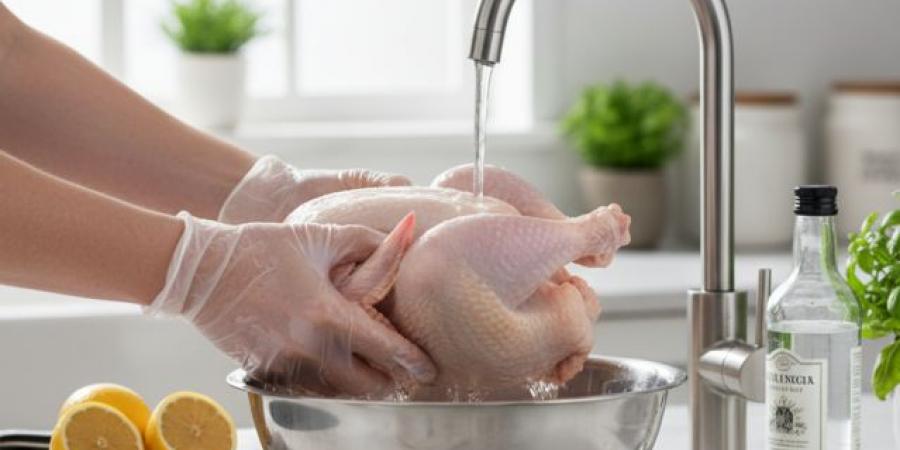نعرض لكم زوارنا أهم وأحدث الأخبار فى المقال الاتي:
Steps to Clean Chicken from Unpleasant Smells and Odors - المصدر 7, اليوم الأربعاء 12 نوفمبر 2025 11:00 صباحاً
المصدر 7 - Raw chicken is a kitchen staple, but it’s also one of the trickiest foods to handle safely.
Even when it’s fresh, chicken can sometimes have a strong, unpleasant odor that makes you second-guess whether it’s still good to cook.
The truth? That smell doesn’t always mean it’s spoiled — but it does mean you need to clean it properly.
From eliminating raw-meat odors to removing slime and bacteria, proper cleaning ensures your chicken is safe, fresh, and ready for seasoning.
Here are the most effective, science-backed steps to clean chicken and get rid of unwanted smells — safely and hygienically.
1. Start with Fresh, Cold Chicken
The first step to odor-free chicken starts before you even clean it.
Why it matters:
Chicken that’s been left out at room temperature too long starts to produce sulfur-like compounds, which cause the foul “chickeny” smell.
Science says:
According to the USDA, raw poultry should be stored at or below 40°F (4°C) and cooked or frozen within 1–2 days of purchase.
Steps:
Check the expiration date before buying.
Keep chicken in the coldest part of your fridge.
Never leave raw chicken out for more than 30 minutes.
Pro tip:
If it smells sour, rotten, or “eggy,” it’s safer to discard it — no cleaning method can fix spoiled meat.
2. Use Lemon or Vinegar Rinse
Natural acids like lemon juice and vinegar help neutralize the proteins and bacteria responsible for bad smells.
Why it works:
Acidic liquids break down the fatty residues and sulfur compounds that cling to chicken skin and flesh.
Science says:
A Food Control study found that vinegar and lemon solutions significantly reduce bacterial growth, including Salmonella and E. coli.
How to do it:
Mix ½ cup of white vinegar or the juice of one lemon with 2 cups of water.
Place the chicken in the mixture for 5–10 minutes.
Rinse briefly with cold water afterward.
Pro tip:
Don’t soak for too long — prolonged exposure can affect the meat’s texture.
3. Rinse Under Cold Running Water (Carefully)
A quick rinse can remove residual blood, slime, or marinade that might contribute to bad smells — but it must be done safely.
Why it matters:
Rinsing spreads bacteria easily if not done correctly.
Science says:
The CDC warns that splashing water during washing can spread bacteria up to 3 feet around your sink area.
How to do it safely:
Use low water pressure and keep the chicken close to the sink bottom.
Immediately clean the sink and surrounding surfaces with disinfectant.
Dry the chicken with paper towels (don’t reuse them).
Pro tip:
Avoid warm water — it can start cooking the surface slightly and worsen the smell.
4. Remove Excess Fat and Skin
The smell often comes from the fatty skin and residues attached to the chicken.
Why it matters:
Fatty tissue traps odors more than lean meat does. Trimming it away can significantly improve freshness.
Science says:
Studies show that fat oxidizes faster than protein, producing unpleasant smells and taste changes.
Steps:
Use a sharp knife to remove visible fat and loose skin.
Trim off dark spots or leftover feathers.
Pro tip:
Always disinfect your cutting board afterward with hot water and soap.
5. Use a Salt Scrub for Deeper Cleaning
Salt is a natural deodorizer and mild antibacterial agent — perfect for cleaning chicken without chemicals.
Why it works:
Coarse salt helps exfoliate the surface of the meat, removing slimy residues and lingering odors.
Science says:
Food hygiene experts recommend salt as a traditional cleaning method that helps control bacterial load and improves texture.
How to do it:
Sprinkle coarse salt generously over the chicken.
Rub it in gently for a minute or two.
Rinse thoroughly with cold water.
Pro tip:
You can combine salt with lemon juice for extra freshness and deodorizing power.
6. Pat Dry Thoroughly Before Cooking or Storing
Moisture is the enemy of freshness — it encourages bacterial growth and makes odors return quickly.
Why it matters:
Dry chicken absorbs marinades better and cooks more evenly.
Science says:
The Journal of Food Protection notes that keeping meat surfaces dry reduces bacterial activity by up to 80% compared to damp storage conditions.
Steps:
Use paper towels to pat dry all sides.
Don’t reuse towels or cloths to avoid cross-contamination.
If you plan to marinate, do so immediately after drying.
Pro tip:
Never store damp chicken in a covered container — condensation traps smells inside.
7. Sanitize Your Workspace Immediately
Cleaning chicken isn’t just about the meat — it’s about everything that touched it.
Why it matters:
Raw poultry can carry bacteria like Salmonella and Campylobacter that linger on countertops, knives, and sponges.
Science says:
The FDA reports that most foodborne illness outbreaks linked to poultry come from poor kitchen sanitation after handling raw meat.
Steps:
Wash all surfaces with hot soapy water, then disinfect.
Replace sponges or use disposable wipes.
Wash your hands for at least 20 seconds with soap.
Pro tip:
Keep a designated “raw zone” in your kitchen and never mix cutting boards for meat and vegetables.














0 تعليق